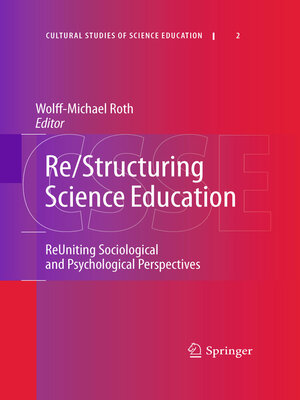Re/Structuring Science Education
ebook ∣ ReUniting Sociological and Psychological Perspectives · Cultural Studies of Science Education
By Wolff-Michael Roth

Sign up to save your library
With an OverDrive account, you can save your favorite libraries for at-a-glance information about availability. Find out more about OverDrive accounts.
Find this title in Libby, the library reading app by OverDrive.



Search for a digital library with this title
Title found at these libraries:
| Loading... |
Since its beginnings, science education has been under the influence of psychological theories of knowing and learning, while in more recent years, social constructivist and sociological frameworks have also begun to emerge. With little work being done on showing how the perspectives of these separate approaches might be integrated, this work aims to plug the gap. The book helps lay the groundwork for reuniting sociological and psychological perspectives on the knowing, learning, and teaching of science. Featuring a range of integrative efforts beginning with simple conversation, the chapters here include not only articles but also commentaries that engage with other papers, as well as a useful running narrative that, from the introduction to the epilogue, contextualizes the book and its sections. Specific attention is given to cultural-historical activity theory, which already offers an integration of psychological and cultural-historical (sociological) perspectives on collectivelymotivated human activities. A number of chapters, as well as the contextualizing narrative, explicitly use this theory as a framework for rethinking science education to achieve the reunification that is the goal of this work.
All the contributors to this volume have produced texts that contribute to the effort of overcoming the extant divide between sociological and psychological approaches to science education research and practice. From very different positions—gender, culture, race—they provide valuable insights to reuniting approaches in both theory and method in the field. As an ensemble, the contributions constitute a rich menu of ideas from which new forms of science education can emerge.






